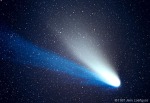Blaze Your Name in the Night Sky
Take a look at the night sky above you and name a few of the celestial objects you know in your head. Would you like to leave your name written in the annals of astronomy and human history? One of the greatest honours for an astronomer is to have their name adorn a celestial body in the night sky. Look up into the night sky and many of the stellar bodies you see will have been named in honour of their discoverer, a famous figure of history or science, or will have been given a designation of some type to distinguish them from other stellar bodies. Humans will forever speak of the distant ice balls at the fringe of the solar system we refer too as the Kuiper Belt and Haley's Comet.
True, the chances of a celestial body in the night sky being named for a particular amateur astronomer is remote, at best, considering the competition and the fact that the decision is made by other powers in the universe. The possibility of this certainly increases for a professional astronomer making a significant discovery, but the final decision is still in the hands of other powers. There are a lot more amateur astronomers looking at the night sky on a nightly basis than professional astronomers, and this fact alone is going to make it likely that amateur astronomers will make significant contributions to the history of astronomy.
It certainly wouldn't be surprising if a professional astronomer or two have spent a few moments in contemplation of a celestial body being named in their honour or moment in time when they could be making astronomy history. Speculating astronomers might have even gone to the trouble of choosing a name for their discovery? The actual naming of newly discovered celestial bodies is actually conducted by other powers in the world of astronomy.
This doesn't mean that amateur astronomers aren't honoured by having their names adorn a celestial body in the night sky. Tom Bopp, an amateur star-gazer will forever live-on in the minds of humans as the discoverer of the biggest comet of the twentieth century, Hale-Bopp, which was also independently discovered by astronomer Alan Hale.
The only way you can hope to leave your name written in the history of astronomy is to spend time watching the night sky above you. Every time you board your time machine to the stars soar upward and out into the cosmos, you could find something that no human has seen before.
Join me every night as we'll journey to the beginning of the universe and go on a voyage of discovery that will take us to unknown parts of the universe.
In : naming stars

